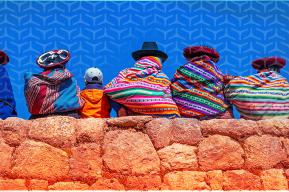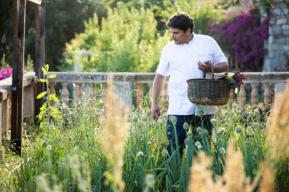Idea
60 years of commitment by HRH The Princess of Hanover
Through your long-standing commitment to UNESCO (2003) as a Goodwill Ambassador, you have supported numerous actions in support of the most vulnerable children. What would your main recommendations be to ensure that these children have a future free from ignorance and misery?
My role as a UNESCO Goodwill Ambassador is to spread the message about the importance of education, especially for women and girls.
Getting children into school is essential to break the cycle of poverty, foster economic and social development, and to prepare future generations to meet the challenges ahead.
Education should be a priority for governments and the international community just as UNESCO has been striving to make it for a long time.
While it's important to get this message across effectively, we also need to be aware of those things that might hinder access to education, so that we can do something about it.
Within AMADE, the Association des Amis de l'Enfance which I chair, we have developed a range of programmes to protect and develop children throughout the world. AMADE is based on a vision: that of a world where every child, whatever their social, religious or cultural background, can live with dignity, in safety and with their fundamental rights respected. A world where every child can fully express his or her potential.
As part of its objectives, AMADE protects the most vulnerable children against violence, exploitation and abuse; promotes their development by contributing to their access to education and health; and supports change through advocacy.
AMADE makes its contribution to child protection by developing a tangible and pragmatic approach, relying on local players to support change in an efficient and sustainable way. AMADE's programmes, based on our experience in the field, are ambitious and open up great prospects. Over the last ten years, AMADE has supported more than 60 projects in 24 countries, for the protection and development of children, totalling almost 6 million euros and impacting 280,000 beneficiaries.
Education is a right that must be granted to all children. How do your actions help those who aren’t always lucky enough to go to school?
Our mission is to improve the quality of primary education, give young girls' access to secondary education - which is not always the case in some countries - and support mothers' literacy.
Some of the principal programmes in AMADE, are developed to target the issues facing children. 237 million children under the age of 5 have no birth certificate, and 166 million are not registered with the civil authorities. Without civil status, a child cannot benefit from legal status and be guaranteed the protection of his or her civil, political, economic, social and cultural rights. Access to education is therefore compromised. As part of the "Civil Status for All" programme, we aim to bring about a change in public policy in favour of a birth registration system that is better adapted to the socio-economic and cultural contexts of each country; to make the population more aware of the importance of registering their children with the civil authorities; to increase the number of children whose births are registered within the legal deadlines set by law; and to reduce the number of children under 18 who do not have a birth certificate. In terms of access to education, this translates into a reduction in the number of children unable to access secondary education for lack of civil status.
As part of this programme, more than 250,000 children in the Democratic Republic of Congo and Burkina Faso will be issued with birth certificates, giving them access to secondary education. The "Dignity for Women" and "Energy for Hope" programmes are also helping to improve access to secondary education for young girls and to make access to affordable, sustainable, good quality energy a driver for development for children and the communities in which they grow up. Access to energy is more than just light - it's an excellent opportunity to access information, knowledge and services.
In Niger, and more specifically in rural areas on the Ganguel plateau, in addition to improving access conditions to primary and secondary education, 50% of students at the benchmark secondary school in the target zone are now girls, compared with 16% initially. Access to education also requires more educational content, accessible to the whole population through new technologies. To this end, we are working to develop and distribute a tailored digital offering for education, health and protection. In Senegal, for example, the Nomad mobile app gives secondary school pupils access to all mathematics content in Wolof to help them improve their school results.
Education is not only a fundamental right: it is also a powerful driver of economic development and social justice.
As studies by the UNESCO Institute for Statistics have shown, if all adolescent girls and boys completed their secondary education, poverty worldwide would be halved. This is why the Principality of Monaco supports UNESCO's Her Atlas project, which monitors girls' and women's right to education. This tool provides an overview of existing provisions throughout the world.
What messages of hope can you share for a fairer, more equal world for future generations?
Our best hope for the future is our children.
And I would add that if the human race is to have a bright future, the answer lies in their education! Education is the fertile ground in which human genius can flourish. It provides individuals with the tools, knowledge and opportunities they need to develop their creative, innovative and constructive potential, and so contribute to improving the human condition. Education also gives meaning to our lives.
These are all the messages linked to Education that I bear as a UNESCO Goodwill Ambassador and that I implement through the practical actions developed through AMADE, in order to leave no one behind and because every child counts. (#ParcequeChaqueEnfantCompte).
In conclusion, what is your view of the educational role carried out by teachers, and what would be your message about events that have affected You?
I want to make a strong statement about the murders of teachers, acts of the most barbaric cowardice which are aimed at dehumanising us all.
What can we do when teachers are afraid: afraid to say anything, afraid to do anything, afraid even to go into a place that symbolises life itself?
Tell teachers that we are with them, that they have saved our lives by giving us the ability to think beyond ourselves, and that it is through their daring and high standards that we have grown. What kind of school will it be when no teacher feels free to encourage reflection, discovery and transmission?
When terror sends everyone back to their supposed community, based on the principle that children should only be taught what they already know so as not to offend them, so as not to drag them out of the safe confines we have created for them. What will become of pupils when no one has any ambition for them?
I am borrowing the words of Tania de Montaigne here, who expresses my rage and fear better than I can.






